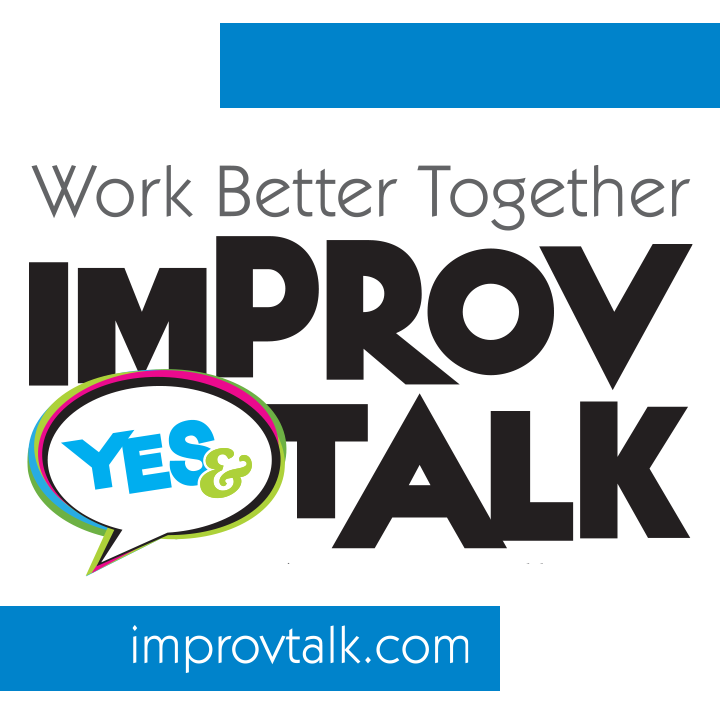

A quick conversation…
Jim Mecir: Every time I looked at one of my colleagues, I wondered if he had somebody buried in the basement. Then I wondered if he knew that was the vibe he was giving.
Ellen Schnur: I was in an improv class with Susan Messing, the “Funniest Woman in Chicago” according to Chicago Magazine. She stopped me in a scene and asked me what I was feeling toward the other person. I said I was mad at them. She promptly replied, “Great, would you please tell your face!”
Are you aware of the messages you send with your body language?
Ellen: When you are on stage, the audience sees and hears everything. If your body language doesn’t fit what you are saying, they won’t buy in. Hence the admonition from Susan Messing, “Go Tell Your Face!” The same can be true in life.
What is Your Face Saying?
A famous study by Albert Mehrabian, Professor Emeritus of Psychology at UCLA, found that when people perceive a contradiction between the words, the tone and the physicality of the speaker, they believe the words least of all and measure nearly all of their faith in the speaker’s trustworthiness by the tone and physical appearance (vocal cadence, gestures, clothes, facial expressions) of the speaker. (If you are a communication study geek like me, check out how this study is often mistakenly cited. *)
Jim: Just like my neighbor, sometimes pitchers are oblivious of the effect their body language has in a game. When they are not doing well on the mound, some begin to slump their shoulders, their head is down and they may even be muttering to themselves, sending clear signals to the batter that they are struggling. Often when batters see a pitcher sending those signals, the batters gain confidence and can’t wait to get out and grab a bat. Any time you know your competitor’s confidence is down, it raises your confidence that you are going to win.
The truth is, that the very next pitch could result in a double play and they are out of the inning, but if the pitcher stays low in confidence, that probability goes way down.
Ellen: I once worked with a wonderful woman who had a sparkling personality in person, but as soon as she got on stage she turned into a straight-faced bore. I taped one of her presentations and asked her to point out how many times she smiled at the audience (I counted 0). She cited quite a few smiles and I asked her, “Really, is that the way you smile?” After a bit more probing, she admitted that her father had once told her that she looked ugly when she smiled (nothing could be further from the truth!!!), and so she was self-conscious in front of groups about smiling. Once she realized why she didn’t smile, and was reassured that was completely wrong (who doesn’t look even BETTER when they smile!!!), she lit up the stage. Funny how words can stick to us.
Jim: In everyday life, I notice other people’s body language and make judgements, but I don’t think about what people see in me.
Ellen: When I first saw you speak, your facial expressions and body language were VERY neutral.
Jim: You mean boring! It comes from my baseball training, not to ever show emotion on the mound. It carried over to my everyday life and my motivational speaking. But then I took your improv workshop and began adding emotion to my stories.
Ellen: And now you are a terrific storyteller!
Jim: I guess the bottom line is your body language needs to match the message you want to get across.
Ellen: In one of my acting classes at 2nd City we divided monologues into “beats.” Simply put, you identify feelings or objectives to various parts of the monologue. For instance if in one section I’m feeling sad or upset, I write “Sad” by that beat and try to read that section with “sad” body language – a slower pitch, sad facial expressions, maybe even a slumped posture or by hanging onto something. This is a POWERFUL tool for presentations and, of course, one of the things that makes an actor successful!
Jim: Want to stop people from texting or wandering off in their heads during a presentation? Try adding beats to it. You’ll knock it out of the park!
*The Albert Mehrabian study is often mistakenly said to conclude that in communication your words only matter 7%, how the speaker sounds 38%, and how they look, 55%. This myth comes from a complete misrepresentation of his research in the 1960’s about how much the communication of feelings and attitudes — likes and dislikes — depends on the words, tone of voice and facial expressions or body language. The experiments themselves were conducted on a very small and uniform sample of volunteers and tested just single words with only the face visible, so it is difficult to extract any meaningful figure from the research. But one thing is clear: this is not about communicating information, it is about communicating feelings.
About ImprovTalk
Another workshop. Another yawn. Oh no, it isn’t! ImprovTalk isn’t your ordinary workshop or keynote address! Audiences laugh out loud while learning, practicing and implementing the skills that lead businesses to succeed.
Each lesson is demonstrated with a compelling business lesson and practiced through interactive group activities. Improvisation exercises create a relaxed atmosphere and encourage opportunities for camaraderie, creative thinking, and quick responses.
Former MLB Pitcher and New York Hall of Famer, Jim Mecir and Improviser and Trainer, Ellen Schnur team together to help audiences take their professional skills to a whole new level with enhanced communication, collaborative team building and innovative creativity.
Ellen steps off the stage to lead audiences to ditch fear, let go of judgment and seek new possibilities in every career role. Equipped with both formal improv training from the highly acclaimed Second City, IO (formerly Improv Olympic) and many fellow improv masters, and with 20+ years in a corporate career, Ellen successfully injects learning with energy, laughter and fun to produce immediate results.
Jim pitches powerful experiences of adversity, adaptability and resiliency that invigorate the core of work life. With a lifetime dedicated to overcome the challenges of being born with a clubfoot, Jim achieved his dream to be a Major League Baseball player. Through Jim’s compelling stories and jaw dropping experiences, he inspires audiences to take time to integrate each other’s strengths and challenges in order to form successful projects, teams and organizations.
Together, Ellen and Jim instill confidence, reignite creativity and open communication channels. Audiences leave knowing they are equipped to help employees, teams, leaders, businesses and organizations work better together to achieve individual, team and company goals.
Contact ImprovTak today to make significant differences in your organization!



